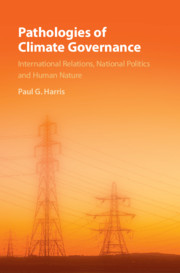
-
Select format
-
- Publisher:
- Cambridge University Press
- Publication date:
- February 2021
- February 2021
- ISBN:
- 9781108526029
- 9781108423410
- 9781108437530
- Dimensions:
- (229 x 152 mm)
- Weight & Pages:
- 0.56kg, 294 Pages
- Dimensions:
- (229 x 152 mm)
- Weight & Pages:
- 0.435kg, 294 Pages
You may already have access via personal or institutional login
Book description
Earth's climate is in crisis. Climate governance has failed. This book diagnoses climate governance as if it were a sick patient, uncovering the fundamental factors causing the worsening climate crisis. It distils decades of global climate negotiations to reveal the features of international relations that are impeding climate action, and it identifies political obstacles to climate governance across a variety of countries in the Americas, Asia, and Europe. The psychosocial aspects of climate change are explored to show how human nature, overconsumption, and global capitalism conspire to stymy climate action. Remedies are suggested for how to overcome hurdles to effective climate governance internationally and nationally, with ideas provided for individuals to help them align their own interests with those of the global environment. Covering all of the major recent events in climate politics and governance, this is an accessible book for concerned readers who want to understand the climate crisis.
Reviews
‘Paul Harris provides an excellent account of the major structural, political and psychosocial causes of the climate crisis and the failures of climate governance - but ends positively with a shopping list of plausible policy solutions. Very accessible, often provocative, sometimes depressing, but always engaging, this should be read by everyone interested in climate politics.’
Neil Carter - University of York
‘In this book, Paul Harris provides a thought-provoking analysis of the instincts and behaviours that governance systems and societies will need to confront if they are to succeed in controlling the most serious impacts of climate change. Its accessible writing style and clear lines of argumentation will make it a useful resource for academics, decision-makers and students of the politics of climate change.’
Ian Bailey - University of Plymouth
‘Highly recommended.’
M. E. Carranza Source: Choice Connect
‘a very timely book … The book is a great overview of climate change governance … [it] could be used as a climate policy textbook and would be of interest to anyone concerned with global climate governance policy.’
Richard Smardon Source: Journal of Environmental Studies and Sciences
Contents
Metrics
Altmetric attention score
Full text views
Full text views help Loading metrics...
Loading metrics...
* Views captured on Cambridge Core between #date#. This data will be updated every 24 hours.
Usage data cannot currently be displayed.
Accessibility standard: Unknown
Why this information is here
This section outlines the accessibility features of this content - including support for screen readers, full keyboard navigation and high-contrast display options. This may not be relevant for you.
Accessibility Information
Accessibility compliance for the PDF of this book is currently unknown and may be updated in the future.


